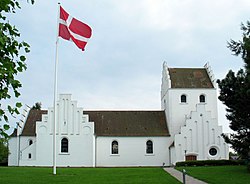
Back كنيسة وطنية Arabic كنيسه وطنيه ARZ Nationalkirche German Iglesia nacional Spanish کلیسای ملی Persian Église nationale French Ազգային եկեղեցի Armenian Gereja nasional ID 국민교회 Korean Folkekirke NB
| Part of a series on |
| Nationalism |
|---|

A national church is a Christian church associated with a specific ethnic group or nation state. The idea was notably discussed during the 19th century, during the emergence of modern nationalism.[citation needed]
Samuel Taylor Coleridge, in a draft discussing the question of church and state around 1828 wrote that
- "a National Church might exist, and has existed, without Christianity, because before the institution of the Christian Church – as [...] the Levitical Church in the Hebrew Constitution, [and] the Druidical in the Celtic, would suffice to prove".[1]
John Wordsworth, Bishop of Salisbury, wrote about the National Church of Sweden in 1911, interpreting the Church of Sweden and the Church of England as national churches of the Swedish and the English peoples, respectively.
The concept of a national church remains alive in the Protestantism of United Kingdom and Scandinavia in particular. While, in a context of England, the national church remains a common denominator for the Church of England, some of the Lutheran "folk churches" of Scandinavia, characterized as national churches in the ethnic sense as opposed to the idea of a state church, emerged in the second half of the 19th century following the lead of Grundtvig.[2] However, in countries in which the state church (also known as the established church) has the following of the majority of citizens, the state church may also be the national church, and may be declared as such by the government, e.g. Church of Denmark,[3] Church of Greece,[4] and Church of Iceland.[5]
- ^ Samuel Taylor Coleridge. On the Constitution of the Church and State. Classic Books Company; 2001. ISBN 978-0-7426-8368-6. p. 59.
- ^ Dag Thorkildsen, "Scandinavia: Lutheranism and national identity" in World Christianities, c. 1815–1914, vol. 8 of The Cambridge history of Christianity, eds. Sheridan Gilley, Brian Stanley, Cambridge University Press, 2006, ISBN 978-0-521-81456-0, pp. 342–358.
- ^ Shadid, W. A. R. (1 January 1995). Religious Freedom and the Position of Islam in Western Europe. Peeters Publishers. p. 11. ISBN 9789039000656.
Denmark has declared the Evangelical Lutheran church to be that national church (par. 4 of the Constitution), which corresponds the fact that 91.5% of the population are registered members of this church. This declaration implies that the Danish State does not take a neutral stand in religious matters. Nevertheless, freedom of religion has been incorporated in the Constitution. Nielsen (1992, 77) gives a short description of the position of the minority religious communities in comparison to that of the State Church: The Lutheran established church is a department of the state. Church affairs are government by a central government ministry, and clergy are government employees. The registration of births, deaths and marriages falls under this ministry of church affairs, and normally speaking the local Lutheran pastor is also the official registrar. The other small religious communities, viz. Roman Catholics, Methodists, Baptists and Jews, have the constitutional status of 'recognised communities of faith'. ... Contrary to the minority religious communities, the Lutheran Church is fully financed by the Danish State.
- ^ Enyedi, Zsolt; Madeley, John T.S. (2 August 2004). Church and State in Contemporary Europe. Routledge. p. 228. ISBN 9781135761417.
Both as a state church and as a national church, the Orthodox Church of Greece has a lot in common with Protestant state churches, and even with Catholicism in some countries.
- ^ Encyclopedia of Protestantism. Infobase Publishing. 1 January 2005. p. 283. ISBN 9780816069835.
When Iceland obtained home rule in 1874, the new constitution, while granting religious freedom, maintained the Evangelical Lutheran Church as "a national church . . . supported by the State." This was reaffirmed in the 1944 constitution of the new independent Republic of Iceland. Democratic reforms were adopted early in the 20th century that allowed for some independent decision making in parish councils, and let congregations choose their own pastors. Under a 1998 law, the church became largely autonomous, though it is still designated established church, supported by government taxes. At the end of the 19th century, Lutherans who wanted freedom from the state church founded the Evangelical Free Church of Iceland, which now has in excess of 7,000 members. The majority of Icelanders are members of the state church. Almost all children are baptized as Lutheran and more than 90 percent are subsequently confirmed. The Church conducts 75 percent of all marriages and 99 percent of all funerals.
© MMXXIII Rich X Search. We shall prevail. All rights reserved. Rich X Search